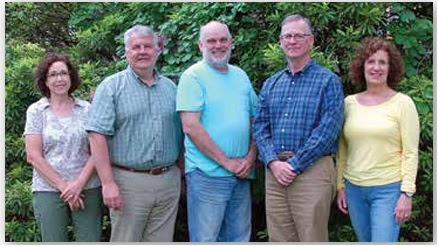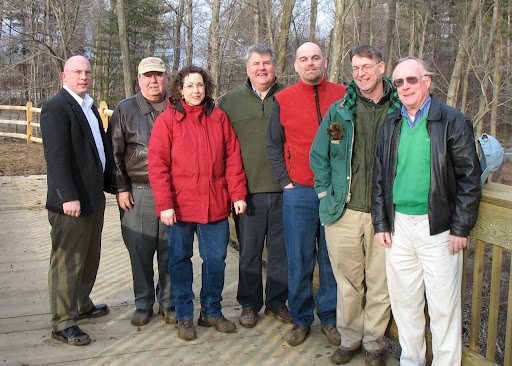The Friday edition of the Shelton Weekly has its comments after our press conference a week ago. As customary, my comments are in red.
http://www.zwire.com/site/news.cfm?newsid=17409775&BRD=1648&PAG=461&dept_id=11784&rfi=6
Referendum to preserve farmland in Shelton By: Isabel Senés, Weekly Editor
Voters in Shelton will have an opportunity to decide whether the city should purchase the development rights to 130 acres of land on the Jones Family Farm on Election Day.
The following referendum question will be on the ballot on Nov. 7 for all Shelton voters: "Shall the resolution appropriating $4,300,000 for the acquisition of a conservation easement in land consisting of approximately 130 acres known as the Jones Family Farm for its preservation perpetuity as farmland and authorizing the issue of $4,300,000 bonds of the City to meet said appropriation be approved?"
In April of this year the Board of Aldermen held a special meeting authorizing Mayor Mark Lauretti to negotiate with Jones Family Farms for the possibility of the city purchasing the development rights to the 130-acre parcel of land known as Homestead Acres.
Homestead Acres on the Jones property is located in the heart of the Means Brook Greenway corridor, surrounded by the previously protected properties of the Valley Farm and the Shelton Family Farm. If the city purchases the development rights for Homestead Acres, the property will remain under private ownership, but will always have to remain as farmland.
The owners of the property will continue to pay taxes to the city. "It is in the interest of the City of Shelton to see the property preserved from other land uses and remain agricultural. This is best accomplished via a purchase of development rights," said Tom Harbinson, co-chairperson of the Conservation Commission.
The City of Shelton applied for a grant from the United States Department of Agriculture's Farm and Ranchland Protection Program earlier this year to help offset the cost of the purchase. In June the city received word that they had been successful in the grant application, and could be awarded 13 percent of the overall appraisal value of the property, or $910,106, if the city agreed to purchase the development rights for Homestead Acres.
An appraisal of the property was completed in May, and the overall appraisal value for the development rights of the property stands at $6.8 million, according to Harbinson. The Jones family agreed to reduce the overall amount by $1.7 million as a gift, and the USDA grant will contribute $910,106. The city of Shelton's share stands at 62 percent of the overall appraisal value, or $4.3 million, which will be requested by referendum on Nov. 7.
Harbinson believes that the purchase is well worth the price."Our concern is that the public is aware of the farm and forest preservation protection program. We're hoping the voters will overwhelmingly support it to show to other agricultural workers that this is something the community supports."According to Harbinson, Homestead Acres could be approved for 60 new homes.
Nick Lauriat, member of the Conservation Commission, expressed real concern about the tax burden new homes could place on Shelton residents."Subdivisions will add a tax burden on the community due to an increased demand for city services," said Lauriat.
** The commissioner's name is "Hank" Lauriat. Residential development will increase the tax base, bringing in more tax revenue. Residential development when occupied brings demand for City services (sewer treatment, road plowing, garbage pickup, education costs, etc). The net on average of residential tax base revenue vs. the cost of services to those residences is net negative. This is countered with either commercial development to the tax base, or elimination of land from potential residential development.
The Jones family has worked the land on their farm for the past six generations. While Terry Jones admits he is not eager to sell to the many developers that come knocking on his door each year, he feels that preservation through the town ensures a "legacy for the future."
"So many people think the farm will never be sold-but there is a constant threat of selling because of the estate tax. Future generation may not want to farm, lawsuits, divorce settlements-any of these things could dismantle a farm. This way the city knows it's always going to be undeveloped," said Jones."Investing in preservation helps control the need for more city services, while providing opportunity for economic development by bringing in outside visitors, which will contribute to downtown business," said Jones. "It's a holisitic approach to the city's future."
The development rights of the 92 acres of Jones property, known as Pumpkinseed Hill, was preserved in 1998, with the cost shared between the city and the state.
Mayor Lauretti said that the purchase of the development rights of the Jones property "falls in line with our philosophy of preserving areas of interest" in Shelton and is important in controlling potential strain on city services. "The only way to do that is to secure the land," said Lauretti. "These are difficult decisions with hefty price tags, but that's what we've evolved to.
** Well put by the Mayor. These are difficult decisions, and there will be more of them to be made. The compelling issue is knowing they will have increasing "price tags" as the remaining land diminishes. It will be challenging to financially prepare appropriately, and fairly to current and future beneficiaries of such protections with such burdensome costs. Bonding the cost over many years is one way to accomplish that.
Subscribe to:
Post Comments (Atom)



No comments:
Post a Comment